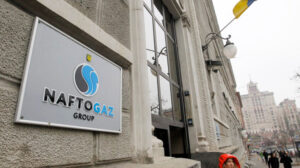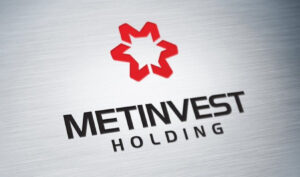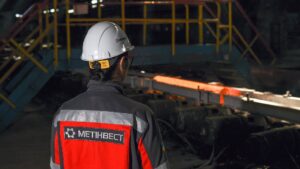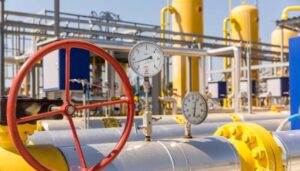
Naftogaz Group companies paid UAH 44.4 billion in taxes in the first six months of 2025, of which UAH 40.7 billion went to the state budget, according to Serhiy Koretsky, chairman of the board of Naftogaz of Ukraine.
“In the first half of 2025, Naftogaz Group companies paid UAH 44.4 billion in taxes to budgets of all levels, which is almost 7% of all tax revenues to the country’s budget,” he said in a Facebook post on Friday.
He noted that of this amount, UAH 40.7 billion went to the state budget and another UAH 3.7 billion to local budgets.
“Supporting the financial stability of the state is an integral part of our responsibility as a company operating in a strategic sector of the economy,” Koretsky commented.
As reported, the consolidated revenue of the Naftogaz Group in 2024 increased by 22.0% to UAH 298.75 billion, and net profit by 63.9% to UAH 37.91 billion.

Zaporizhia enterprises of the mining and metallurgical group Metinvest – Zaporizhstal, Zaporizhogneupor, Zaporizhkox, and Zaporizhzhya Foundry and Mechanical Plant (ZLMP) – increased their transfers to budgets of all levels by 20% in January-June this year compared to the same period last year, totaling almost UAH 1.7 billion in taxes and fees.
According to a press release issued by the group on Wednesday, Metinvest Group companies also remain among the largest taxpayers in Zaporizhia. Tax revenues to local budgets for the first half of 2025 amounted to over UAH 543 million, which is 10% higher than in the first six months of 2024.
In the structure of taxes and fees for this period, the largest in terms of volume were single income tax and single social contribution payments. It should be noted that in April 2025, Metinvest raised salaries for employees of production and service enterprises, including in Zaporizhia, by up to 20%.
A significant share of deductions also falls on environmental and land taxes, as well as military levies.
Taking into account associated companies and joint ventures, Metinvest Group paid UAH 9.3 billion in taxes and fees to budgets of all levels in Ukraine in the first half of 2025.
Zaporizhstal is a joint venture of the Metinvest Group, whose main shareholders are System Capital Management (71.24%) and Smart Steel Limited (23.76%). Metinvest Holding LLC is the managing company of the Metinvest Group.

JTI Ukraine, one of the largest companies on the market, paid UAH 21.2 billion in taxes to the state budget in the first half of 2025, which is 75% more than in the same period of 2024.
“The main factors behind the growth were legislative changes, in particular the increase in excise tax rates, as well as improvements in the company’s operating performance and changes in the exchange rate,” the company said in a press release on Monday.
According to the press release, excise taxes traditionally accounted for the largest share of tax revenues, amounting to UAH 16.4 billion, which is 81% more than in the first half of 2024.
It is noted that VAT payments increased by 73% to UAH 2.76 billion as a result of stable demand, adaptation to regulatory changes, and balanced cash flow management.
“Significant growth was also recorded in other areas: income tax (+45%), customs duties (+37%), single social contribution (+24%), personal income tax and military tax (+36%),” according to a press release quoting JTI Ukraine CFO Olga Sulitska.
The company added that in the second half of the year it plans to strengthen risk management while maintaining stability in tax and social obligations.
JTI Ukraine is part of Japan Tobacco International (headquartered in Geneva), the international tobacco business of the Japan Tobacco group of companies (headquartered in Tokyo). It has been operating in Ukraine since 1999 and is currently represented by two companies with over 800 employees: JTI International Company Ukraine, with its central office in Kyiv, and four regional offices and a factory in Kremenchuk (Poltava region), JTI International Ukraine.
JTI Ukraine manufactures products for both the domestic market and for export to nine countries around the world. The declared investments over 26 years of operation amount to over $433.7 million, with additional investments of $60 million planned for 2024–2026 in the category of tobacco products for electric heating (TPE).
According to YouControl, JTI International Company Ukraine increased its revenue by 37.7% to UAH 18.60 billion in the first half of this year, and its net profit by 15.7% to UAH 1.11 billion.
Revenue of JT International Ukraine grew by 61.8% in January-June this year, to UAH 4.74 billion, while net profit doubled to UAH 1.23 billion, according to YouControl data.
As reported, another major player in the tobacco market, Philip Morris Ukraine, previously reported a 17% increase in tax payments for January-June 2025, to UAH 28.9 billion (excise tax – UAH 22.9 billion, VAT – UAH 5.4 billion).
According to the Ministry of Finance, excise tax revenues in the first half of 2025 increased by 45.7% to UAH 132.7 billion.

In January-June of this year, the mining and metallurgical group Metinvest, including its associated companies and joint ventures, transferred UAH 9.3 billion to budgets of all levels in Ukraine, compared with UAH 9.9 billion in the same period last year.
According to the company’s press release on Monday, the three largest payments were subsoil use fees, which amounted to UAH 2.5 billion, a single social contribution of UAH 1.7 billion, and UAH 1.6 billion in personal income tax.
In addition, Metinvest’s Ukrainian enterprises paid UAH 670 million in income tax and UAH 328 million in environmental tax in January-June 2025. Military tax for the first half of this year increased more than threefold compared to the same period in 2024, to UAH 472 million, and land tax increased by 5% to UAH 659 million.
“In times of war, paying taxes is our direct contribution to the protection and restoration of the country. After all, the financial responsibility of business is a source of strength for the army, medicine, education, and millions of Ukrainian families. We have learned to move forward even in the most difficult times — to work despite threats, to support the economy, and to help the front. We are keeping up the pace because we know that our resilience is part of our common victory,” said Yuriy Ryzhenkov, CEO of the group.
As previously reported, in 2024, Metinvest transferred UAH 19.8 billion in taxes and fees to budgets at all levels in Ukraine.
Metinvest is a vertically integrated group of mining and metallurgical enterprises. Its enterprises are located in Ukraine, in the Donetsk, Luhansk, Zaporizhia, and Dnipropetrovsk regions, as well as in the European Union, the United Kingdom, and the United States.
The main shareholders of the holding company are the SCM Group (71.24%) and Smart Holding (23.76%). Metinvest Holding LLC is the managing company of the Metinvest Group.

Representatives of the tourism sector paid UAH 1 billion 613 million in taxes to the state budget in January–June 2025, which is 29% more than in the same period of 2024, according to the press service of the State Agency for Tourism Development of Ukraine.
According to the head of the State Agency for Tourism Development, Natalia Tabaka, in addition to inflationary factors, the growth is explained by the revival of domestic tourism. In particular, the number of taxpayers is also growing: as of the first half of 2025, the number of registered business entities operating in the tourism sector exceeded 14,500, which is 5% more than in the same period last year.
Hotels remain among the leading taxpayers, accounting for 71% of total revenue, or UAH 1.144 billion. For comparison, in 2024, this amount was UAH 809 million, in 2023 – UAH 570 million, and in pre-war 2021 – UAH 665 million.
Tour operators paid almost UAH 195 million in the first half of this year (UAH 165 million in the first half of 2024 and UAH 88 million in 2023).
Travel agencies paid UAH 153 million in the first half of the year, which is 49% more than in the same period of 2024.
Recreation centers and children’s camps paid more than UAH 92 million, 18% more than last year.
As for the tourist tax, local budgets received more than UAH 142.5 million in the first half of 2025, which is 34% more than in the same period last year. The number of tourist tax payers also increased: from 4,945 in the second quarter of 2024 to 5,717 in the second quarter of 2025.
The top five regions in terms of tourist tax revenue are Kyiv (UAH 33.6 million), Lviv region (UAH 26.5 million), Ivano-Frankivsk region (over UAH 22 million), Zakarpattia region (almost UAH 12 million), and Kyiv region (UAH 7.5 million).

In accordance with the decision of the Cabinet of Ministers, Naftogaz of Ukraine transferred UAH 10.4 billion in dividends for 2024 and income tax to the state budget.
As the company reported on Tuesday, the rest of the profit, in accordance with the government’s order, will be used to prepare the country for winter, in particular to purchase imported gas.
“I would like to thank all employees for the result. Thanks to your conscientious work, Naftogaz remains a reliable partner of the state, fulfilling all obligations imposed by the Ukrainian government in a timely and complete manner,” said Serhiy Koretsky, chairman of the board of Naftogaz Ukraine, whose words are quoted in the statement.
As reported, the Cabinet of Ministers of Ukraine, by order No. 410-r of April 29, 2025, ordered to allocate 30% of the profits of Naftogaz of Ukraine to dividends in the state budget.
“To approve (…) consolidated profits in the amount of 37 billion 906 million 640.18 thousand hryvnias, according to the consolidated financial statements of Naftogaz of Ukraine for 2024, of which the profit attributable to the shareholder of Naftogaz of Ukraine amounts to 29 billion 421 million 763.674 thousand hryvnias (…)”, the document said, in particular.
According to the government decision, 30% of the specified profit of Naftogaz, amounting to UAH 8.826 billion, is subject to payment of dividends to the state budget. Another 70% (UAH 20.595 billion) was allocated by the Cabinet of Ministers for statutory purposes, in particular 45% of the profit belonging to the shareholder of Naftogaz of Ukraine, amounting to UAH 13.239 billion, for the purchase of imported natural gas and financing measures to prepare for the autumn-winter period of 2025/26.